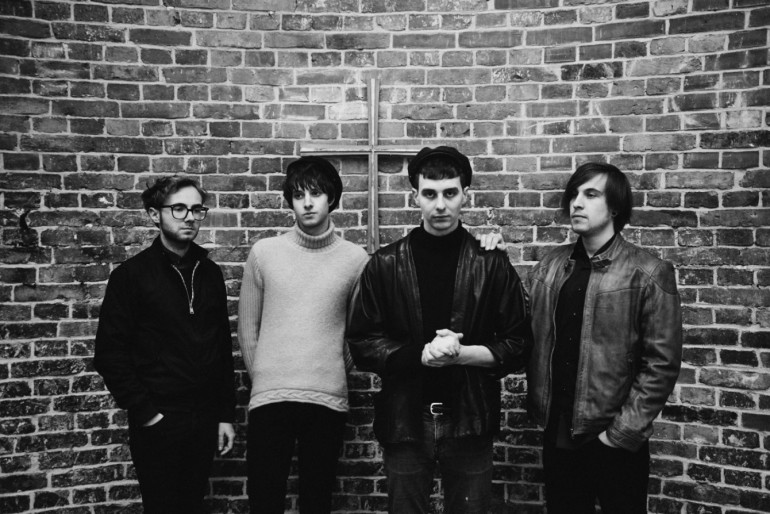
Photo by Noel Richter
What’s the point anyway? Well, that’s a big and quite general question, one of those heavy ones we usually are afraid to ask since we’re too scared of the answer? Life, love, existence, work, relationship? What’s the point of this if these things are all doomed in the end? In those troubled times that are filled with political and societal changes and uncertainty these dark thoughts might haunt you more frequently than before. Maybe it’s also a question of age since the world automatically turns a bit greyer when you reach the age of 30 as when you were in 20 years old. ‘I finally got no dreams anymore, I finally got no hope anymore’ is a sentence Tobias Bamborschke used to sing back on a song called Alles Grau (‘Everything’s Grey’) back on the 2014 debut EP of his band ISOLATION BERLIN, called Aquarium.
There’s not much room for hopeful thoughts in the lyrical world of Bamborschke. Born out of a huge depression his songs are testaments of ‘weltschmerz’, anthems of anxiety, filled with poetic images of the cold and ugly while they partly also celebrate furious frustration at the same time. ISOLATION BERLIN are on the verge of shaking up the German indie music market by offering something the local scene has been lacking for years it seems: honest and ugly lyrics, unpleasant truths and an attitude that preaches total refusal towards anything. ISOLATION BERLIN don’t want to please the mainstream but also don’t want to satisfy critics and the intellectual feuilleton. They just want to make music and express themselves on stage.
‘We shit on our image,’ tells us Bamborschke forcefully when we meet him up on a cold winter day in Berlin. ‘If we were meant to take care of an image on top of all of this we wouldn’t have time for the music.’ It’s that simple. ‘We don’t want to start a movement,’ clarifies the singer but adds with a laugh: ‘Although we might eventually end up doing it, I’m afraid.’ There’s an aura of disinterest that surrounds the singer when he speaks, but not in an arrogant, ‘pseudo rock star’ way. He just don’t like to add anything to the music beyond its production and performance.
‘We write songs, we produce them the way we like it, might film a few videos and that’s it. There’s no room for a concept in that.’
The only strategy is ‘no strategy ‘
And there is something quite powerful in the music of ISOLATION BERLIN. February 19 will see the release of the band’s debut full-length Und aus den Wolken tropft die Zeit (‘And out of the clouds time is dropping’) via acclaimed German independent label Staatsakt. The fact that the music of the Berlin-based four-piece itself isn’t revolutionary or ‘new’ might also be important for its fascination. The band recalls a big international independent and alternative rock sound from THE SMITHS to SONIC YOUTH, sometimes a bit more melodic and British-sounding, sometimes a bit grungier like on their second EP Körper (‘Body’) back in 2015. They can write gentle pop songs like last year’s Annabelle which ironically also played with naive and romantic ideas of love (going to the cinema, driving together on one bike and such things) but also manic and noisy pieces of uncompromising rock like the title-track of the Körper EP or the furious Wahn (‘Delusion’) off the debut album which closes with Bamborschke screaming like a madman while his bandmembers get lost in a loud sea of guitars, bass and drums. ISOLATION BERLIN is about extremes, about extending existing boundaries within the local music scene. An excursus into the history of German independent music might be too much right here but let’s just keep it with: the band serves a certain raw, unfiltered and partly also analogue spirit a lot of listeners are missing these days.
ISOLATION BERLIN ain’t got no Instagram or Twitter account, no marketing or release strategy (‘We collect songs and then we just release them’), they don’t want to be part of any hip Berlin scene. According to their own words the four members don’t go to parties or clubs and prefer to hang out in smoky and dirty old bars, something that more and more becomes a victim of the unstoppable gentrification in the Berlin capital. ‘There used to be more clubs and bars here but know everything’s quite posh and pretty much gone,’ describes Tobias Bamborschke his district Prenzlauer Berg. ISOLATION BERLIN are effected by the changes of the city especially the lyricist and singer who was born and raised here. And every original Berliner might agree on the fact that you share a certain hate/love relationship with the city. Still, the upcoming album refuses to address those societal topics and is strictly personal to quite an intimate level. Still, they might also reflect the general feeling of many Twenty-somethings who tend to get lost and depressed in the sea of possibilities and social pressure such a city can create.

Leading man Tobias Bamborschke (Photo by Noel Richter)
In his usual compactness he describes the story frame for the band’s first album: ‘It starts with a desire for love and ends with a complete avoidance of any emotion and human relationship.’ Bamborschke starts to laugh, well aware of this maybe too simplistic breakdown of his lyrical content. But its the ugliness of human relationships that are the origins of these stories as the singer describes:
‘I started to write songs because I was super depressed and I couldn’t find any songs that spoke to me in that moment, no matter if its German or English music. I needed to create my own songs in that moment and never had the intention to share them with the public. I sense these emotions and stories coming up in me and they need to get out. I need to get these things on paper. I allow these feelings to turn into words. And just when it’s completed we decide whether to release it or not.’
The ISOLATION BERLIN leader ain’t no hothead, he’s a reflective poet that likes his metaphors not to be too cryptic. ‘The music supports the lyrics and the other way around,’ he explains the basic concept, ‘that’s the only thing that matters.’ And clearly the songs on Und aus den Wolken tropft die Zeit are intense anthems that showcase a band that is not willing to make compromises when it comes to their art. Anything else makes no sense for Tobias Bamborschke and his band which is partly also funded by the governmental Musicboard Berlin. And, of course, they couldn’t care less as the singer explains that economical affair in only two sentendes: ‘Somebody came to a show of us and told us that there’s the possibility for funding. We applied for it, got the money and were happy.’ Again, he’s laughing. Also about the possibility to release an ISOLATION BERLIN techno remix album (obviously named Isolation Berlin Calling) or a collaboration with a national star of German’s popular Schlager scene. You see, the world is not entirely grey for these guys and one thing remains sure: the only rule here is that there are no rules, only the music. It’s a stubborn self-confidence by example, one you might even enjoy if you’re not fluent in German and can also work as a role model for other bands all over the world. Well, we’re pretty sure Bamborschke would surely laugh about that amount of pathos and simply don’t care. Thank god.
Here are 5 Isolation Berlin tracks to get you started
‘Alles Grau’ (Everything Grey)
‘Annabelle’
‘Körper’ (Body)
‘Isolation’ (a 1:1 JOY DIVISION cover)
‘In manchen Nächten’ (In some nights)
—



